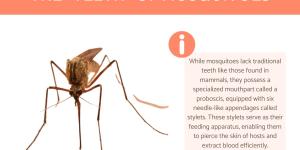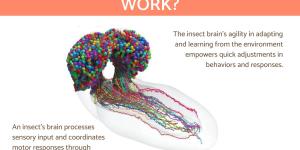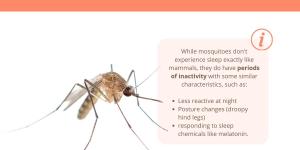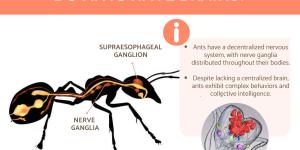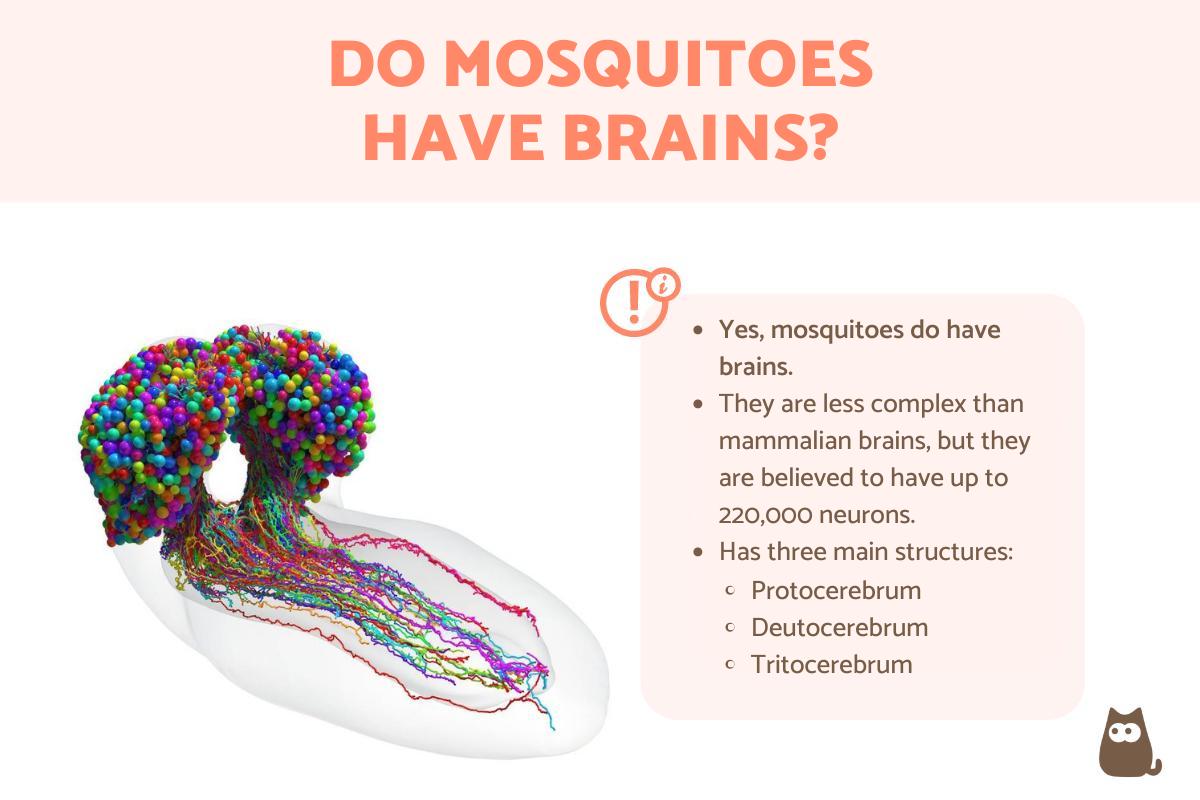Do Mosquitoes Have Brains?

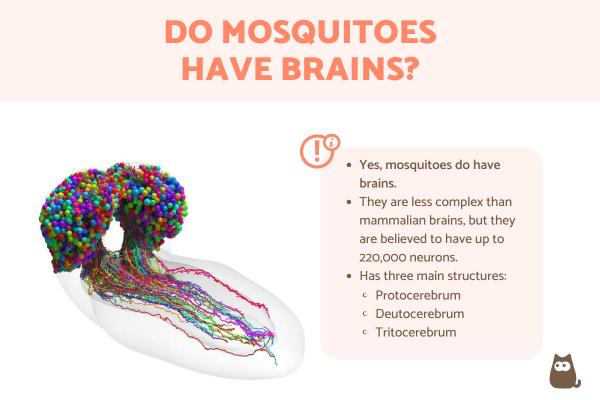
If you wanted to impugn someone's intelligence, you may say they have a mosquito brain. The implication is that mosquitoes have such low intelligence they have no brains at all. Being such small invertebrate animals, they are not known for complex cognitive processes such as emotional reactions. They are known for their ability to bite the skin of vertebrates, including humans. When they do so, female mosquitoes suck blood for sustenance. This process can also lead them to being a disease vector since pathogens can pass between the insect and the bloodstream of the host. This is not an active behavior on the mosquito which is only looking to feed. Their action appears to be drone like since they are so single-minded in their feeding behaviors. This leads AnimalWised to ask do mosquitoes have brains?
Indeed, mosquitoes do have brains. Although they may not be as complex as other animals, mosquito brains function in a similar way which allow them to be such incredible survivors in often very harsh habitats. We understand their behaviors by looking at mosquito brain function and structure.
Do mosquitoes have brains?
Mosquitoes are insects that belong to the order Diptera, specifically within the Culicidae family. Although their brain is considerably simpler compared to those of mammals, mosquitoes do have brains. It is part of their central nervous system which is equally less complex than other animals such as vertebrates.
The brain of a mosquito is made up of a series of nervous structures that control various basic functions. These structures include the:
- Protocerebrum: associated with vision and motor coordination.
- Deutocerebrum: related to smell perception and sensory coordination.
- Tritocerebrum: plays a role in regulating diet and other behaviors.
The brain of mosquitoes allows them to process sensory information from their environment. One of the most important is the presence of odors that indicate food sources. The detection of body heat is also important for signaling the presence of possible hosts. The mosquito brain allows them to coordinate complex movements, such as flight and searching for food.
It is important to understand the function of the mosquito brain as it is crucial for developing effective strategies to control diseases transmitted by these insects. For example, mosquitoes are vectors of diseases such as dengue, Zika and malaria.
These insects detect volatile chemical signals using receptors expressed in thousands of sensory neurons. By understanding how the mosquito brain influences host-seeking behavior, scientists can develop better methods to prevent the transmission of these diseases.
The structure of a mosquito brain
The brain of mosquitoes is relatively simple compared to that of mammalian animals like ourselves. Regardless, it is still a vital organ that allows them to perform various functions necessary for their survival.
The brain of mosquitoes is made up of a series of nervous structures that are part of their central nervous system. As we have already mentioned, these structures include the protocerebrum, the deutocerebrum and the tritocerebrum. We look at the mosquito brain structure in more detail:
Protocerebrum
The protocerebrum is the region of the mosquito brain primarily associated with vision and motor coordination. In terms of vision, this region processes visual information received by the mosquito's compound eyes. These consist of thousands of individual units called ommatidia. They coordinate with the optic lobes in the protocerebrum to detect movements, recognize objects and find light sources.
Additionally, the protocerebrum is involved in coordinating mosquito body movements, including flight, landing, foraging and reproduction. If you have ever had to chase a mosquito out of a room, you will see how acute the responses afforded by the protocerebrum can be. This region also plays a role in the formation of memories associated with sensory experiences and learned behaviors.
Deutocerebrum
The deutocerebrum is the part of the mosquito brain related to smell perception and sensory coordination. Mosquitoes have highly sensitive antennae that they use to detect odors in their environment, especially chemical compounds released by potential food sources. One of the most important is carbon dioxide emitted by mammals that alerts mosquitoes to a potential dinner.
The olfactory information captured by the antennae is processed in this part of the mosquito brain which are connected by antennal lobes. It is then analyzed and neural activity patterns are used to guide the mosquito towards potential food sources. In addition to smell, the deutocerebrum may also be involved in the perception of other sensory stimuli, such as touch and taste. These are used to a much lesser extent than in the perception of smell.
Tritocerebrum
The tritocerebrum is the region of the mosquito brain that plays a role in regulating feeding and other basic behaviors. This region may be involved in the coordination of sensory and motor activities, helping the mosquito perform actions such as feeding, mating and seeking shelter.
Although less studied than the protocerebrum and deutocerebrum, the tritocerebrum may also be involved in the modulation of behavioral responses to external stimuli. This includes the integration of sensory information from different sources.
To learn more about mosquito anatomy, you can take a look at our article explaining whether mosquitoes have teeth.
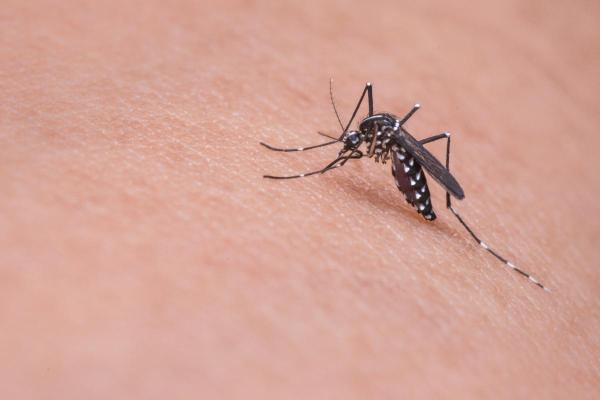
Mosquito brain function
We have explained its structure, but it is important to know how the mosquito brain works. The functioning of the mosquito brain involves a complex interaction between several neural regions that process sensory information. In doing so, they can coordinate motor function and behavioral responses. These insects receive sensory information from the environment through different sensory organs, such as eyes, antennae and taste organs in their mouthparts.
As explained above, the protocerebrum and deutocerebrum are responsible for processing visual and olfactory information, respectively. For example, the protocerebrum integrates visual information captured by the mosquito's compound eyes to detect movements, recognize objects and find light sources. Meanwhile, the deutocerebrum processes olfactory signals to locate possible food sources, such as mammals or flowering plants.
Sensory information can also be processed in other parts of the mosquito's central nervous system, such as the tritocerebrum. This may be involved in the coordination of sensory and motor responses, although the function of the tritocerebrum is poorly understood. Once the sensory information is processed by the brain, the mosquito can make decisions about how to respond to those stimuli.
These decisions may involve actions such as flying toward a food source detected by smell, avoiding a visual obstacle detected by sight or seeking shelter in response to adverse environmental conditions. The mosquito brain coordinates these responses through neuronal activity in different nervous regions and the transmission of signals between them.
The brain is also involved in regulating basic mosquito behaviors, such as feeding, mating and seeking shelter. These behaviors are influenced by internal and external factors such as food availability, the presence of predators and weather conditions.
The brain of a mosquito coordinates the execution of these behaviors by activating specific neural circuits and integrating sensory and hormonal signals. Furthermore, the size and complexity of mosquito brains are adapted to their needs and lifestyle as flying insects. Although they have a smaller number of neurons compared to mammals (approximately 220,000[1]), their nervous system allows them to perform behaviors essential for their survival.
Given such great adaptation to their environment, you may wonder about mosquito survival. If so, you can learn more with our article explaining how long mosquitoes live.
If you want to read similar articles to Do Mosquitoes Have Brains?, we recommend you visit our Facts about the animal kingdom category.
1. Raji, J. I., & Potter, C. J. (2021). The number of neurons in Drosophila and mosquito brains. PloS one, 16(5), e0250381.
https://doi.org/10.1371/journal.pone.0250381
- Coutinho-Abreu, I. V., & Akbari, O. S. (2023). Technological advances in mosquito olfaction neurogenetics. Trends in Genetics, 39(2), 154-166.
- Ignell, R., Dekker, T., Ghaninia, M., & Hansson, B.S. (2005). Neuronal architecture of the mosquito deutocerebrum. Journal of Comparative Neurology, 493(2), 207-240.
- Zhao, Z., et al. (2022). Mosquito brains encode unique features of human odor to drive host seeking. Nature, 605(7911), 706-712.

